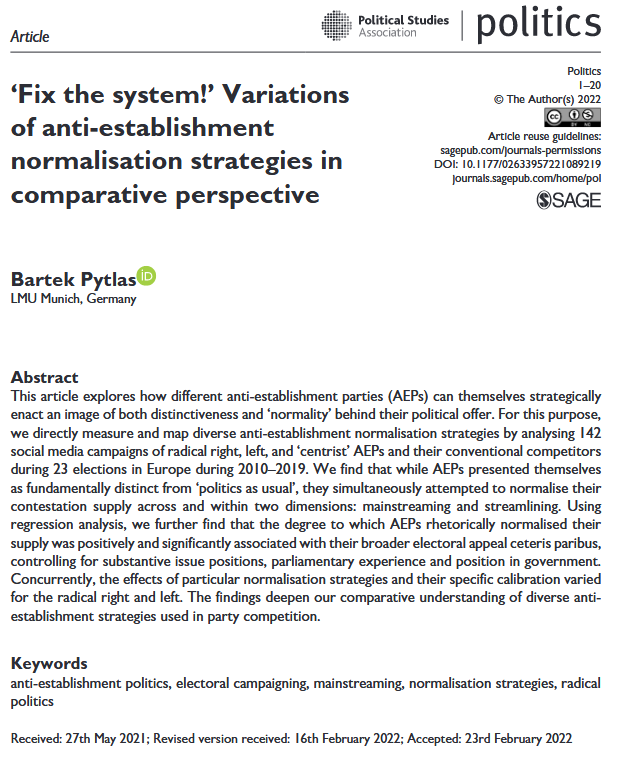🌟New paper & data #openaccess #PartyPolitics. Mapping party campaigns 2010-19 I show that to understand how thin ideas play into electoral gains of anti-establishment parties, we need to look beyond just populism @GSI_Muenchen @ExtremandDem @PopulismTeam journals.sagepub.com/doi/10.1177/13… 



Populism has become a popular buzzword. Some approaches thus argued that we should drop the term altogether. I instead suggest that we should rather be mindful when applying it. So I don't argue that populism is irrelevant. I nonetheless show that it is not the whole story. 2/ 

We know we should not confuse populism with thick ideas, e.g. nativism. Thick ideas continue to be primary drivers of political contestation. I at the same time argue that parties can use more diverse *thin* ideas as an important auxiliary mobilizing tool in party competition. 3/ 

In the paper I thus look beyond just populism and analyse two further thin claims parties can use to contest how ‘true Elites’ and ‘good representative politics’ should be and work: technocratic expertise and a third, more prosaic appeal to extraordinary political vocation. 4/ 

Parties can use political vocation rhetoric to contest current politics by appealing not to the will of ordinary People, nor to extra-political expertise, but to extraordinary *political* will, skills and virtues seen as vital to revive formal-representative politics itself. 5/ 

The associated open-access dataset measures the salience of diverse thin messages in 142 social media campaigns by radical right, left and centrist anti-establishment parties (AEPs) + conventional ones during 23 elections (🇦🇹🇨🇿🇫🇷🇩🇪🇮🇹🇵🇱🇸🇰🇪🇸) 2010-2019.
https://twitter.com/bartekpytlas/status/15095722825906708486/
I find: while some AEPs were strongly populist, electoral appeals to specifically populist general will were in trend quite rare. On average, in the past turbulent decade AEPs prominently and increasingly linked the ‘People vs. Elite’ conflict with political vocation messages. 7/ 



AEPs which emphasized political vocation performed better electorally than those which used them less, ceteris paribus. Although conventional parties used political vocation to a comparable extent, they were less able to use this rhetoric to foster their distinctive reputation 8/ 

Anti-establishment or populist rhetoric played a role within specific AEP groups. Yet, the common denominator behind higher electoral performance of AEPs across the political board was not populism, but claims to revive a ‘true’ way of doing conventional politics itself. 9/ 

Naturally, thin supply isn't the only nor automatic explanation of AEP rise. But I show it is important to account for diverse and more prosaic auxiliary strategies parties use to contest politics, such as enacting to be the only ‘truly conventional’ party left standing. 10/
Very happy that the paper found such a great home #PartyPolitics @PaulDWebb1. Thankful to the Reviewers, to @Aaron_R_Martin, and to further colleagues at many conferences for their very helpful feedback. Especially grateful to my coding team in the @dfg_public project. 11/ #End
• • •
Missing some Tweet in this thread? You can try to
force a refresh













